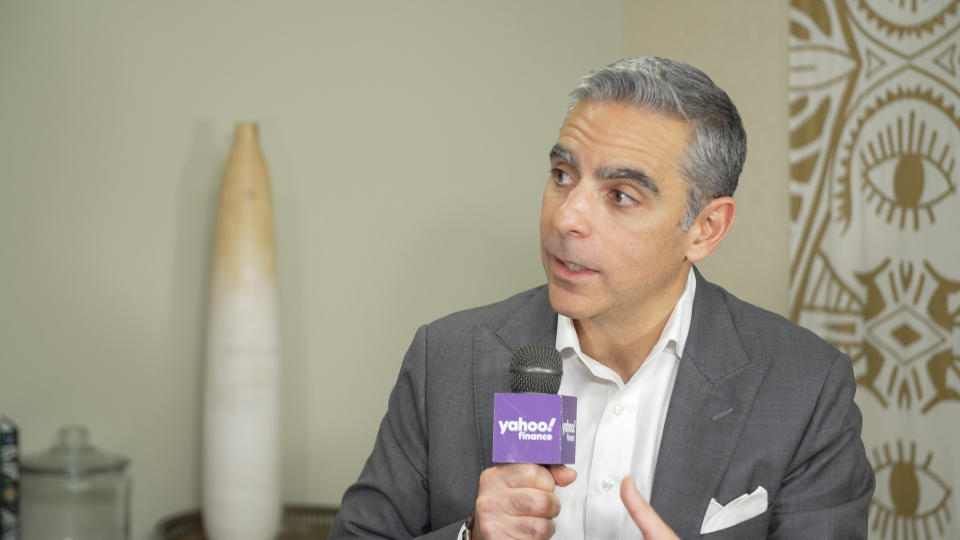Libra's co-founder: 'There is a chance' the cryptocurrency could present systemic risk
The Facebook executive behind the Libra blockchain project says its developers are designing the cryptocurrency under the assumption that it could grow large enough to present risks to the economy.
“We should assume that there is a chance that this could have systemic risk and design it in a way that it cannot become a systemic risk,” David Marcus, the head of new Facebook subsidiary Calibra, told Yahoo Finance on Tuesday.
Marcus acknowledged “legitimate” regulatory concerns that Facebook’s massive user base of about 2.7 billion people could make Libra so large that disruption could risk system-wide financial instability.
But Marcus said Facebook (FB) users will not instantly become Libra users on day one, noting that those wanting to have a “Calibra” wallet for the currency will have to upload their government ID and identify themselves before they can buy, sell, and pay for things using Libra.
“I believe that it's going to take a long time for us to actually on-board a lot of people for this to come even close to a systemic risk,” Marcus said.
In June, Facebook launched a Calibra subsidiary and tasked it with creating a blockchain that would support a “low-volatility” cryptocurrency called Libra. The currency would be backed by short-term government securities and fiat currency, which users would deposit into the reserve when they exchange their money for units of Libra.
Libra would be backed by a basket of currencies, reported to be mostly U.S. dollars with a mix of euro, yen, sterling, and Singapore dollars. Marcus says Libra would be designed to ensure “proper stability” such that users could easily get their money in and out “even in extreme moments of stress in the global economy.”
Real-time payments
Shortly after Facebook released the white paper laying out the plan for Libra, Federal Reserve Chairman Jerome Powell said Libra “does have systemic scale” because of Facebook’s huge user base.
“[Libra] needs a careful look, so I strongly believe we need all to be taking our time here,” Powell told Congress July 10.
The Fed later announced that it would be embarking on its own initiative to develop a real-time payments system, which does not propose the creation of a currency like Libra but would speed up the time it takes for money to clear from one bank to another. One of Libra’s key use cases is as a faster facilitator of payments between users and merchants across its network.
Marcus said the FedNow real-time payments system, which will not come until 2023 or 2024, is not a threat to Libra.

“I want to characterize the conversations that we've been having with regulators and central banks all around the world as very constructive and productive,” Marcus told Yahoo Finance. “In other words, they invested a lot of time to understand where we were coming from and what we were trying to do.”
Marcus reiterated that the Libra launch, originally scheduled for the first half of 2020, would be delayed if it does not receive the proper regulatory approval.
‘We have a duty’
Marcus shrugged off concerns about Facebook’s privacy issues hindering the Libra project. Facebook’s larger problems have weighed on Libra ever since its announcement in June; a month after the white paper’s release, the Federal Trade Commission levied a $5 billion fine over Facebook over privacy violations.
Responding to calls on Capitol Hill to break up Facebook, Marcus told Yahoo Finance that the social media company is obligated to innovate the payments system on behalf of the millions of businesses that use its platform.
Marcus said he wants Libra to be the “internet of money” solution to carrying out commerce on the Facebook platform, noting that about 90 million businesses are on the site.
“We have a duty to our users and people using our services to continue innovating on their behalf,” Marcus said.
Per the white paper, Libra blockchain will be designed as a pseudonymous system that allows users to hold one or more addresses that are not linked to their real world identity. At the same time, Libra insists it will meet all anti-money laundering regulations that require some documentation of who is using those services, per “know your customer” rules.
“The aspiration for Libra is to be better at detecting money laundering, terrorism funding, at enforcing sanctions, and doing all these things,” Marcus said. “We aspire to be better than the current system, not only meet the same standards.”
Brian Cheung is a reporter covering the banking industry and the intersection of finance and policy for Yahoo Finance. You can follow him on Twitter @bcheungz.
Facebook’s David Marcus: Libra is ‘absolutely not’ in jeopardy
IMF projects slowest global growth since the crisis amid trade, geopolitical tension
Bank earnings preview: 'Chipping away' at expenses amid a tough environment
Minneapolis Fed's Kashkari: Fed chair should 'say what he thinks we ought to do'
‘The weirdest place in the world’: What the Fed missed in Jackson Hole
Read the latest financial and business news from Yahoo Finance
Follow Yahoo Finance on Twitter, Facebook, Instagram, Flipboard, SmartNews, LinkedIn, YouTube, and reddit.
